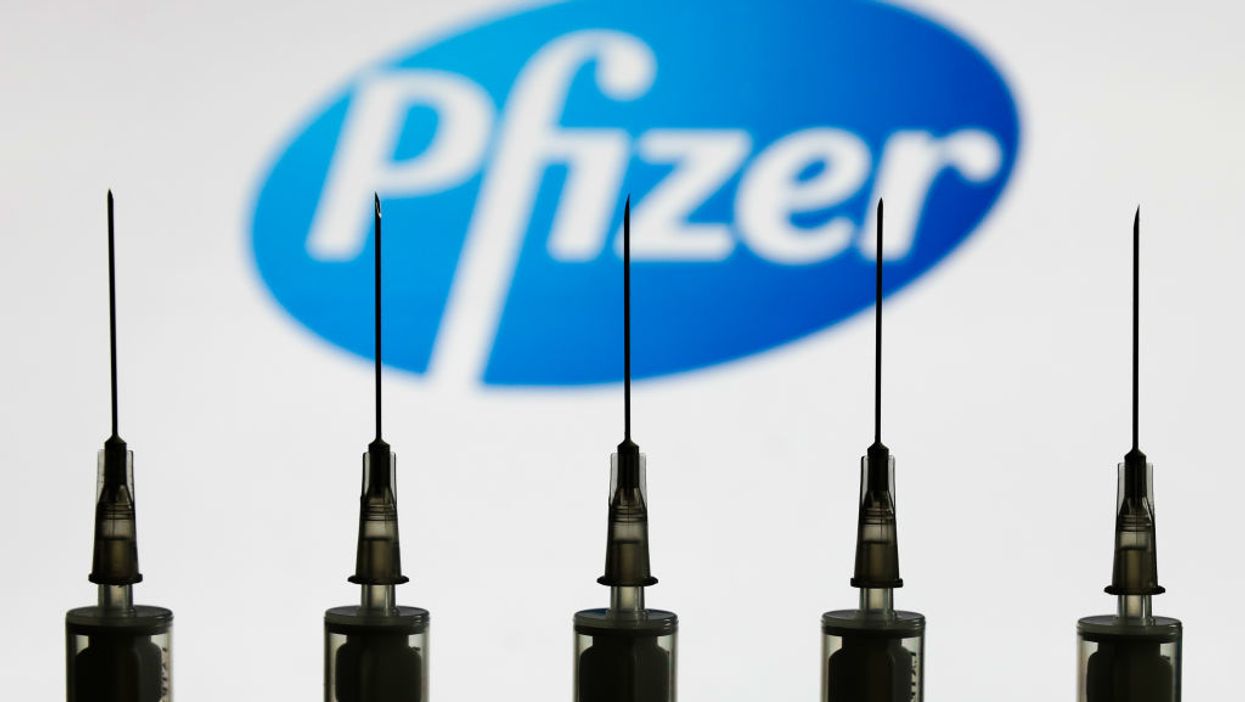
Jakub Porzycki/NurPhoto via Getty Images

'Operating at the speed of science'
Pfizer Inc. said Friday it could apply for emergency use authorization in the United States of its COVID-19 vaccine by late November. In an open letter, Pfizer Chairman and CEO Albert Bourla made the announcement about the progress in developing a coronavirus vaccine with its partner BioNTech, a biotechnology company that manufactures immunotherapies.
"I know there is a great deal of confusion regarding exactly what it will take to ensure its development and approval, and given the critical public health considerations and the importance of transparency, I would like to provide greater clarity around the development timelines for Pfizer's and our partner BioNTech's COVID-19 vaccine," Bourla said.
Bourla said Pfizer is "operating at the speed of science," but there are three steps that must happen before the company can release its COVID-19 vaccine.
"First, the vaccine must be proven effective, meaning it can help prevent COVID-19 disease in at least a majority of vaccinated patients." Then the "vaccine must be proven safe, with robust safety data generated from thousands of patients." The last step is demonstrating that the "vaccine can be consistently manufactured at the highest quality standards."
"We may know whether or not our vaccine is effective by the end of October," Bourla said, based on its 40,000-person clinical trial. "To do so, we must accumulate a certain number of COVID-19 cases in our trial to compare the effectiveness of the vaccine in vaccinated individuals to those who received a placebo."
"So let me be clear, assuming positive data, Pfizer will apply for Emergency Authorization Use in the U.S. soon after the safety milestone is achieved in the third week of November," Bourla wrote. "All the data contained in our U.S. application would be reviewed not only by the FDA's own scientists but also by an external panel of independent experts at a publicly held meeting convened by the agency."
Bourla noted, "The timelines above reflect our best estimates of when these important milestones could be achieved."
A BioNTech spokesperson confirmed the time frame for the potential EUA application to the FDA.
This is the first time any "leading Western vaccine developer provided such a specific timeline," according to the Wall Street Journal.
"Moderna could also apply for an emergency use authorization (EUA) this year. It has said that it may have interim data on its 30,000 person trial as soon as November," as reported by Reuters.
This comes at a time when COVID-19 cases in the U.S. are climbing slightly, but the coronavirus deaths are relatively level this month.
"The spread of the coronavirus appeared to be accelerating this week in the U.S. with a key indicator in 44 of the 50 states and Washington, D.C. flashing an 'ominous' warning sign," a health official told the Wall Street Journal on Tuesday.
On Monday, Johnson & Johnson announced it had paused a large, late-stage clinical trial of its coronavirus vaccine after one of its volunteers became ill with an unexplained sickness. The company pointed out that illnesses, even severe cases, "are an expected part of any clinical study, especially large studies."
On Tuesday, pharmaceutical company Eli Lilly said it paused a government-sponsored antibody treatment trial because of a "potential safety concern."
Last month, President Donald Trump said that a COVID-19 vaccine would be distributed within 24 hours of completion of phase 3 trials and FDA approval. The president touted that all Americans will have access to the coronavirus vaccine by April.
"As part of Operation Warp Speed, my administration has manufactured one of the most promising vaccines in advance, and it will be fairly long in advance, as soon as a vaccine is approved, the administration will deliver it to the American people immediately. Distribution will begin within 24 hours," President Trump said.
The coronavirus vaccine will be free for all Americans, but initially the COVID-19 vaccine will likely be available to higher-risk groups, such as health care workers, essential workers, the elderly, and those with health conditions that make them more vulnerable to COVID-19.
Dr. Scott Atlas, a member of the White House coronavirus response task force, said the COVID-19 vaccine would not be a forced vaccination.
In July, the U.S. Department of Health and Human Services and the Department of Defense (DoD) announced an agreement with Pfizer for an initial order of 100 million doses of a coronavirus vaccine for the price of $1.95 billion, following EUA or licensure. The agreement provides the U.S. government an option to purchase an additional 500 million doses.